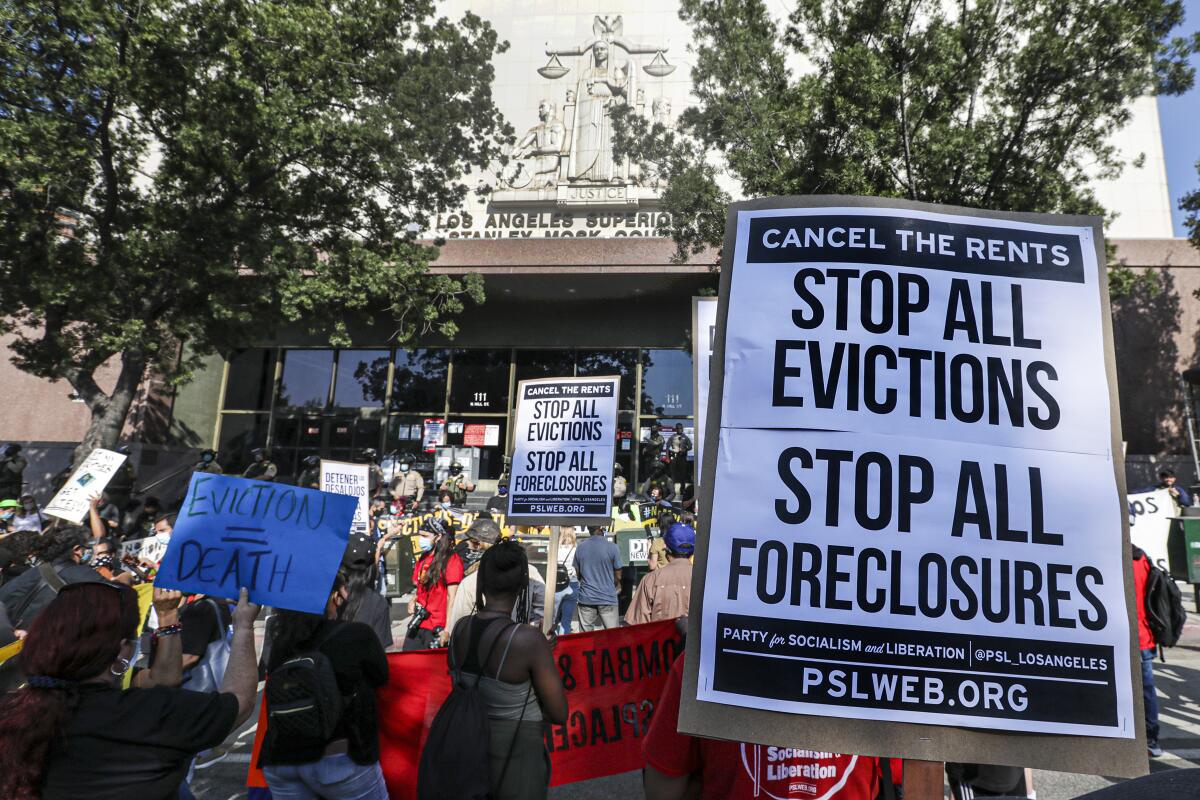Newsletter: Are L.A. tenants about to get a fairer housing market?

Good morning. I’m Paul Thornton, and it is Saturday, Jan. 14, 2023. Happy new year to readers who use the Julian calendar. Let’s look back at the week in Opinion.
Way back in the spring of 2020, The Times’ opinion journalists asked readers to tell us what permanent changes they wanted to see in California brought on by the nascent COVID-19 pandemic. That was about two months after the initial round of restrictions went into force, and at the time there was already plenty of agitation to declare our mitigation measures a success and move on. While we at The Times’ Opinion section were operating under no illusion that the pandemic’s end was near, few of us imagined we’d find ourselves here, approaching the start of Year Four of COVID-19. “Post-pandemic” seemed a lot closer then — perhaps it was a coping mechanism.
Now, as we unwind the protections meant to blunt the effects of mass sickness and job losses, it’s worth looking back at the reader suggestions from 2020 (we received more than 3,700 of them) to see what themes were mentioned most often, and what’s actually happening now. As I wrote in my initial roundup of responses, one of the biggest themes was fairness, and how inequality in its various forms (economic, racial, healthcare access and so forth) primed us for immense suffering from a crisis like the pandemic. Readers expressed hope for long-term changes that would keep people housed, fed and medically cared for even when disaster struck.
With regard to housing fairness, Los Angeles is at an inflection point. As The Times’ editorial board noted this week, the city eviction moratorium that went into effect in March 2020 will expire on Jan. 31, ending a policy that prevented L.A.’s unhoused population from ballooning during a time of massive economic upheaval. The moratorium is a blunt instrument, and as the editorial board says, landlords are understandably upset about losing the ability to evict tenants who are unable or unwilling to pay rent. But in a city where both rent control and the housing supply are too limited to prevent prices from spiraling and struggling tenants from falling into homelessness, it was time to use the blunt instrument. That its impending removal will ruin so many lives shows just how fundamentally dysfunctional Los Angeles’ housing market has become.
So, the editorial board calls on the City Council to adopt a proposal to extend the “just cause” eviction requirement to all rental properties, not just rent-controlled ones. It also wants the council to weigh protections for mom-and-pop landlords who didn’t receive pandemic relief from the state or federal government, since the city and its residents have a vested interest in keeping these owners in business. The board also says the city needs to build more housing over the long term to ease demand and stabilize prices.
These are all good policies in their own right, but the pandemic made devastatingly clear how little fairness is built into Los Angeles’ housing market. The editorial’s closing brought to mind those readers from 2020 who hoped for a more just post-COVID world: “The eviction moratorium will end. But the lessons of the pandemic cannot be forgotten: Renter protections, rent relief and landlord assistance can keep tenants housed and landlords in business.”
California’s budget gets back to reality. You didn’t think the era of $97-billion surpluses and “inflation relief” checks would last forever, did you? This is the first time Gov. Gavin Newsom will have to close a budget deficit — a “modest shortfall” (his words) of $22.5 billion — and the editorial board gives him high marks for declining to dip into the state’s rainy-day reserve to avoid making cuts. Less well-received is Newsom’s $6-billion reduction to climate change initiatives. “Having flush coffers makes governing easier,” says the editorial board. “But when the revenue slows, Newsom and legislators still have enormous authority to make government work better now and into the future.” L.A. Times
Shifting our focus to less-serious governance, let’s look at the new Republican House majority’s first fiscal moves. It isn’t a pleasant sight, says Thomas Kahn, a former Democratic staff director of the House Budget Committee: “Republicans have long claimed they are dedicated deficit hawks, blaming Democrats for growing deficits and debt. But two votes they cast after electing Kevin McCarthy as House speaker prove that Republicans are charlatans when it comes to deficit reduction.” L.A. Times
Jan. 6 in the U.S., Jan. 8 in Brazil: Sadly, South America’s largest country has its own violent insurrection with which to contend, a situation distressingly similar to the sacking of the U.S. Capitol two years ago. Brazil, however, has a history of prosecuting corrupt former leaders since its democracy was restored in 1989, something that political scientist Susan Stokes says should prompt similar action in the U.S.: “The final chapter of [former Brazilian President Jair] Bolsonaro’s story has yet to be written. But we already see hints that the fear of indictment has chastened him. Americans should take this lesson to heart: Though prosecuting former presidents carries risks, the cost of letting insurrectionists and would-be autocrats escape accountability could be too high.” L.A. Times
Enjoying this newsletter? Consider subscribing to the Los Angeles Times
Your support helps us deliver the news that matters most. Become a subscriber.
Firing an art history professor for showing students an image of the prophet Muhammad is out of line. Columnist Robin Abcarian on the controversy at Minnesota’s Hamline University, where a student expressing offense at being shown a painting of the prophet Muhammad led to art history instructor Erika López Prater’s dismissal: “The idea that no one should be able to study historically important images of Muhammad on a college campus because some Muslim students object to them on religious grounds is intellectually indefensible. I hope that Hamline University officials, instead of digging in, recognize their mistake and reinstate López Prater. And that the students who were offended will come to understand that they can live out their convictions without trampling on the rights of others.” L.A. Times
George Santos is trying to pull a Kevin de León. Will either of them get away with it? Columnist Nicholas Goldberg sees a similarity among politicians today who disgrace their offices but refuse to resign: “It’s the latest trend among politicians accused of wrongdoing: Brazen it out. Stand firm in the face of accusations that in any previous era would likely have ended your career. Pretend to be on the phone, ignore the curses and catcalls, deny the charges. Stonewall. And see what happens.” L.A. Times
Stay in touch.
If you’ve made it this far, you’re the kind of reader who’d benefit from subscribing to our other newsletters and to The Times.
As always, you can share your feedback by emailing me at [email protected].
A cure for the common opinion
Get thought-provoking perspectives with our weekly newsletter.
You may occasionally receive promotional content from the Los Angeles Times.




